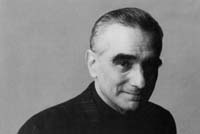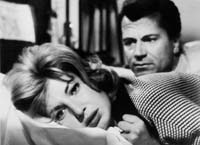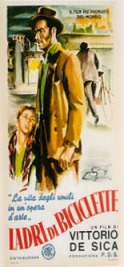|
My Voyage to Italy
aka Il Mio Viaggio in Italia
|
| |
 |
Documentary. USA/Italy, 2001. Rated PG-13.
243 minutes.
Featuring: Martin Scorsese
Editor: Thelma Schoonmaker
Cinematographers: Phil Abraham, William Rexer
Producers: Giorgio Armani, Barbara De Fina, Guiliana Del Punta,
Bruno Restuccia
Director: Martin Scorsese
LINKS
|
 egardless
of what happens with Gangs of New York, Martin Scorsese will have at
least one movie that could end up on my top ten list at year's end. My Voyage
to Italy conveys an infectious enthusiasm for cinema and shines a light
on several groundbreaking films that influenced not only Scorsese, but also
filmmakers and cineastes worldwide. It's similar to his previous Personal
Journey through American Cinema, but doesn't tackle as broad a canvas. Where
the earlier cinematic survey touched on scores of films and filmmakers, Voyage
burrows more deeply into the works of the five major post-WWII Italian directors:
Roberto Rossellini, Vittorio De Sica, Luchino Visconti, Michelangelo Antonioni,
and Federico Fellini.
egardless
of what happens with Gangs of New York, Martin Scorsese will have at
least one movie that could end up on my top ten list at year's end. My Voyage
to Italy conveys an infectious enthusiasm for cinema and shines a light
on several groundbreaking films that influenced not only Scorsese, but also
filmmakers and cineastes worldwide. It's similar to his previous Personal
Journey through American Cinema, but doesn't tackle as broad a canvas. Where
the earlier cinematic survey touched on scores of films and filmmakers, Voyage
burrows more deeply into the works of the five major post-WWII Italian directors:
Roberto Rossellini, Vittorio De Sica, Luchino Visconti, Michelangelo Antonioni,
and Federico Fellini.
Roughly 45 minutes are devoted to each director, and about five films apiece
are examined. Scorsese begins with the seminal neo-realist films of the mid-40s
and finishes with the decidedly unrealistic 8 ½, from 1963.  (It's
rumored that Scorsese plans a follow-up documentary covering Italian cinema
post-1963.)
(It's
rumored that Scorsese plans a follow-up documentary covering Italian cinema
post-1963.)
In a brief introduction, Scorsese explains the formative effect these movies
had on him as a child. Growing up in Little Italy, he encountered many of these
movies for the first time on television, dubbed in English. For him, they were
a link to his cultural heritage, and his immigrant family took the scenes of
war-torn Rome in Rossellini's Open City as reports from back home--the
news of the day. These crude-looking imports stood in marked contrast to the
polished Hollywood product Scorsese saw on the big screen. They seemed from
another world entirely, a world without happy endings, and one that examined
serious issues of poverty, morality, and religion. It's the two sides of cinema,
one sensational and slick, the other hard-hitting and realistic, that Scorsese
later melded into his own style.
Watching the film, I could see which scenes and films were big influences on
Scorsese, not just in terms of style but philosophy as well. When they showed
the introduction of the characters in Fellini's I Vitelloni, it looked
almost exactly like something from Mean Streets or Goodfellas.
The camera glides from one young hoodlum to the next, as the voice-over identifies
each character.  The
conveyance of compassion for the characters in Rossellini's Flowers of St.
Francis reminded me of Bringing out the Dead. Nicolas Cage's description
of his vocation as a "grief mop" bore a resemblance to St. Francis' work assisting
the unfortunate. And now I know what Pauline Kael meant when she referred to
the "Antonioni pirouette" in Taxi Driver--a camera that shuns its human
subject to contemplate a building, or a hallway.
The
conveyance of compassion for the characters in Rossellini's Flowers of St.
Francis reminded me of Bringing out the Dead. Nicolas Cage's description
of his vocation as a "grief mop" bore a resemblance to St. Francis' work assisting
the unfortunate. And now I know what Pauline Kael meant when she referred to
the "Antonioni pirouette" in Taxi Driver--a camera that shuns its human
subject to contemplate a building, or a hallway.
It's a fair bet that most people will not have seen many of these films. A
handful of them aren't even available on video. Among the titles I found especially
interesting, but hadn't seen yet: Paisan, Voyage to Italy, La Terra Trema,
Senso, I Vitelloni, and L' Eclisse. Of the films I had seen, what
struck me most was that I need to see these films restored and on the big screen.
The Bicycle Thief, in particular, packed a much stronger punch in the
bits that were shown versus my mild enthusiasm for it on video. Although well
served by its Criterion DVD, 8 ½ is something else entirely when seen
with a large picture and good sound--I've never seen such exquisite white-on-white
photography, and the way the sound cuts out in Guido's dream sequence at the
fountain sent pleasure-chills down my spine. Mere clips of De Sica's Umberto
D sent just about everyone around me into tears (okay, I may have let loose
a drop or two). Unfortunately, torn from context, it seems much more crassly
manipulative than it is.
Scorsese has a penchant for locating the key sequences in each film. His voice-over
is informative, but he has the sense to know when to withhold it, and let the
original picture do the talking. Those who wish to encounter these films without
spoilers should not see this movie though. Nearly every scene is pivotal. However,
I can attest from having seen A Personal Journey Through American Cinema
that there's a thrill in seeing these climactic scenes presented in context.
It's like when you listen to an album for the first time and your favorite single
comes up. So this is where it belongs. Think of My Voyage to Italy
as a compilation of hit singles from the Italian masters. You walk out of this
movie having seen not just one great film, but many.
My Voyage to Italy will premiere on Turner Classic Movies Friday, June
7, 8:00PM (ET).
Review
© May 2002 by AboutFilm.Com and the author.

 (It's
rumored that Scorsese plans a follow-up documentary covering Italian cinema
post-1963.)
(It's
rumored that Scorsese plans a follow-up documentary covering Italian cinema
post-1963.)
 The
conveyance of compassion for the characters in Rossellini's Flowers of St.
Francis reminded me of Bringing out the Dead. Nicolas Cage's description
of his vocation as a "grief mop" bore a resemblance to St. Francis' work assisting
the unfortunate. And now I know what Pauline Kael meant when she referred to
the "Antonioni pirouette" in Taxi Driver--a camera that shuns its human
subject to contemplate a building, or a hallway.
The
conveyance of compassion for the characters in Rossellini's Flowers of St.
Francis reminded me of Bringing out the Dead. Nicolas Cage's description
of his vocation as a "grief mop" bore a resemblance to St. Francis' work assisting
the unfortunate. And now I know what Pauline Kael meant when she referred to
the "Antonioni pirouette" in Taxi Driver--a camera that shuns its human
subject to contemplate a building, or a hallway.
